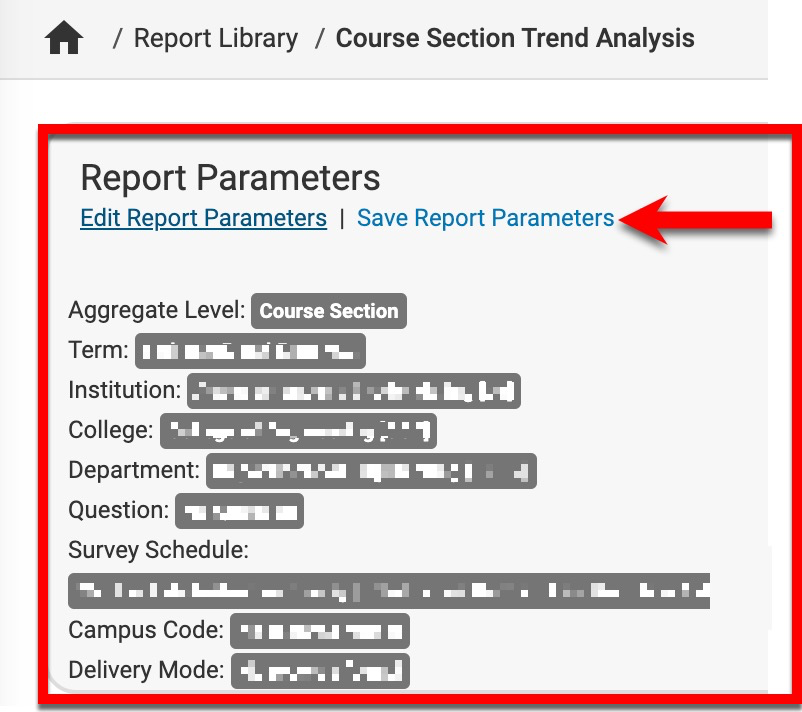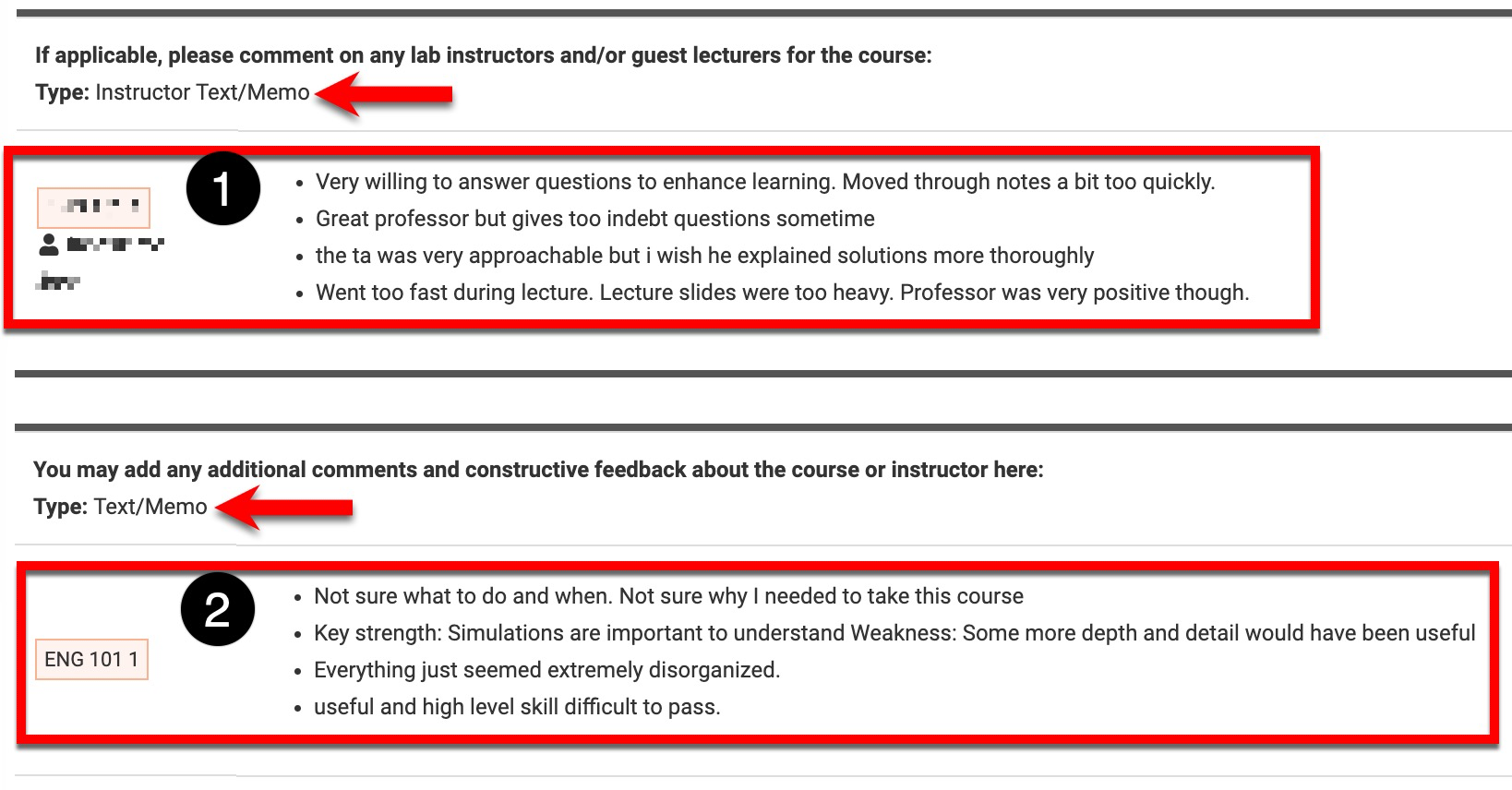📙 Knowledge Base Tip: Reviewing the Report Library article before utilizing any reports is recommended.
This report provides an analysis of course evaluation results over multiple terms. Results can be aggregated at the College, Department, course, and Instructor level. There is the option to compare these results to any level within the Organizational Hierarchy, including average, standard deviation, and mode for all questions in a survey template. User roles with permissions to utilize this report include:
-
College Admin
-
College Survey Admin
-
Course Coordinator
-
Course Section Director
-
Dean
-
Department Admin
-
Department Survey Admin
-
Institution Admin
-
Institution Survey Admin
-
Instructor
-
Preceptor
-
Teaching Assistant
Product Tip
Users with Organizational Hierarchy roles (e.g., Institutions Admin, College Admin, etc.) will only see the business objects (colleges, departments, courses, etc.) they are associated with. For example, College Admins can configure report parameters and view report results only for the course sections associated with the colleges for which they are assigned the admin role.
Use Cases
|
Aggregated Data Analysis & Benchmarking |
|
Institutions can use this report to analyze course evaluation results across multiple terms. By aggregating data at the College, Department, course, and Instructor level, trends in student learning outcomes can be identified. Results can be compared against different levels of the Organizational Hierarchy. For example, compare the performance of a specific department against the college average or even across multiple colleges within the Institution. This benchmarking helps to identify areas of strength and opportunities for improvement. |
|
Accreditation Preparation |
|
Institutions can use the detailed analysis from the report as evidence for accreditation bodies, demonstrating that they are actively monitoring and improving program quality based on direct assessment of learning outcomes. |
Considerations
-
If an Instructor generates this report to aggregate at the Instructor level, and there are course sections that did not meet the minimum threshold, the report output will aggregate all other section's data and will not include or display results from the course sections that did not meet the minimum threshold. Learn more about Course Survey Results Settings and the Minimum Threshold functionality.
Parameters
|
Parameter |
Details |
|---|---|
|
Aggregate Level |
Optional. Choose the Organizational Hierarchy, course, or course section level at which to aggregate the report output. Depending on the selection, other parameters (usually those of a lower organizational hierarchy level) may be locked and unusable; for example, when aggregating at the college level, the Department/Administrative Unit parameter will be unavailable. |
|
Term |
Required. The adaptive search will auto-update search results as they are typed. Multi-select, select all and deselect all functionality is available. |
|
Optional. These parameters are useful for narrowing results and more easily configuring the Course Section parameter. |
|
Instructor Type |
Optional. This parameter is useful for narrowing results and making the configuration of the Instructor parameter easier. |
|
Optional. These parameters are useful for narrowing results. The Instructor parameter populates a list of Instructors based on the configuration of the Courses and Terms parameters. |
|
Additional Parameters |
|
|
Optional. The Survey parameter selection directly impacts the Survey Schedule parameter options. Only schedules associated with the selected survey type will be available for selection. |
|
Campus Code |
Optional. The primary campus code; this is the same code provided in the Course Section data file. |
|
Delivery Mode |
Optional. The primary delivery mode code; this is the same code provided in the Course Section data file. |
|
Optional. These parameters can further narrow down the results displayed after configuring the Course Section parameter. If the Order Questions By parameter defines the order by which survey questions will display in the report output:
|
|
Show Comments |
Optional. When enabled, comments will be included in the report output. |
Report Output

Once report parameters have been configured and Run Report has been clicked, the report output will display below the collapsed read-only view of the report parameters. Clicking Edit Report Parameters will reopen edit capabilities; once parameters have been edited, Run Report can be clicked again to re-generate the report output. Clicking Save Report Parameters will open the Create a New Saved Report pop-up, where the name and description of the new saved report can entered. Once a report has been saved, it will be available via the My Saved Reports tab of the Report Library.
Once the report is generated, and regardless of parameter configuration, a summary of surveys captured in the report output will display the course section code (1) and name (2) for each survey included in the selected survey schedule. Form and form submission totals and the cumulative response rate are displayed for all surveyed course sections (3), and institutional totals are included at the end of the survey summary list (4). The report output can be exported to CSV, Excel, or PDF formats or printed (5).

Below the summary list, survey questions will be displayed. Based on the configuration of the Order Questions By parameter, survey questions may be listed by type (default) or sequentially, although regardless of the Order Questions By parameter configuration, each survey question, its scale, question type (1), and the average, standard deviation, median, and mode for each instructor (2) will be displayed.
-
Avg: The average score; the sum of the responses divided by the total number of responses.
-
StDev: The standard deviation; a measurement of the variation in the response set.
-
Median: The median score; the value at the midpoint of the frequency distribution of responses.
-
Mode: The value that survey participants most commonly selected.

If Instructor Text/Memo or Text/Memo question types were included in any surveys, these question types and their responses will be displayed below the the survey questions list. Instructor Text/Memo question types will include the course section code and the surveyed instructor’s name beside the text comment from the surveyed student (1). Text/memo question types display only the course section code (2). Learn more about question types.

